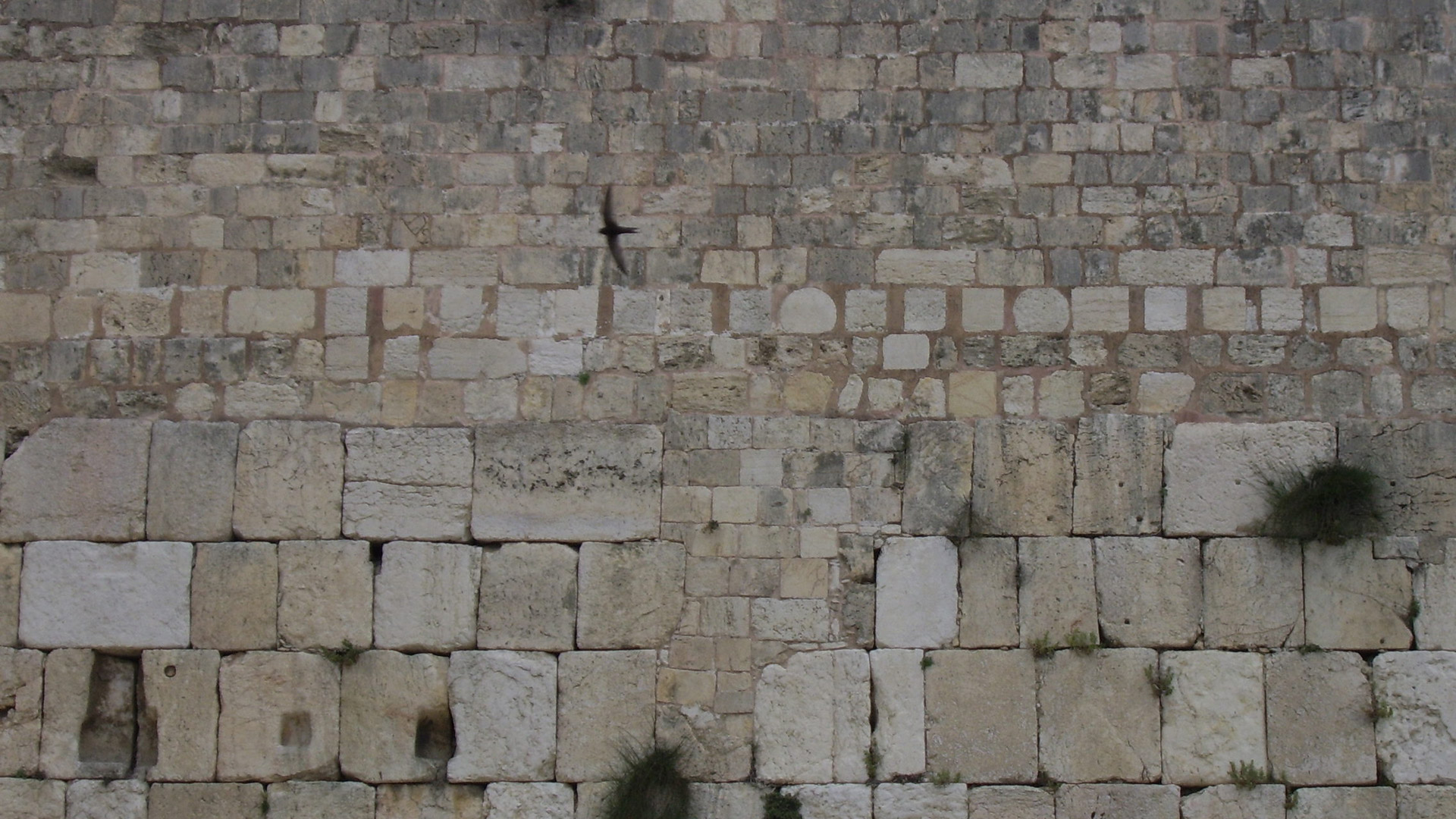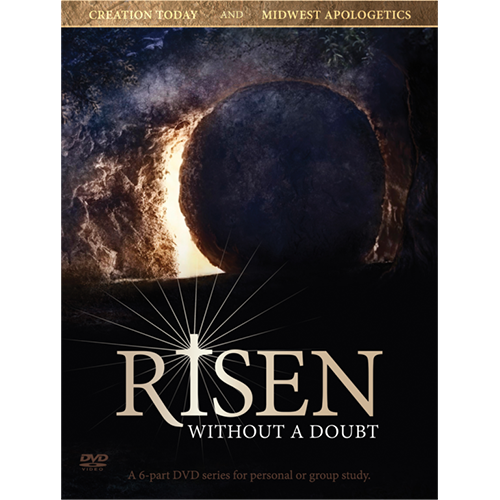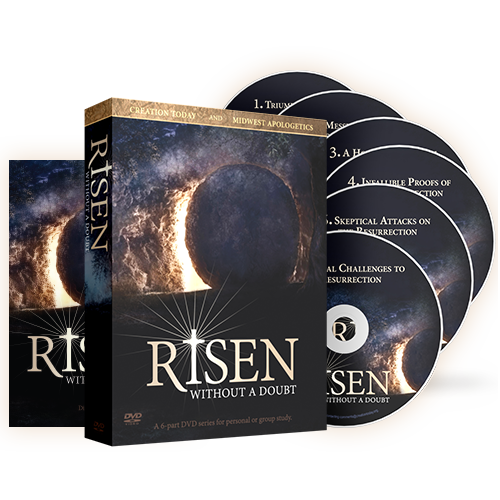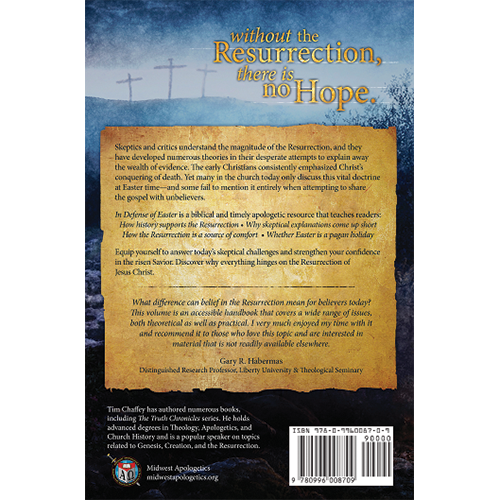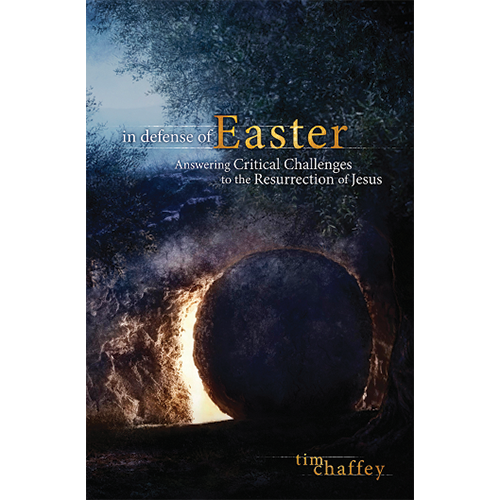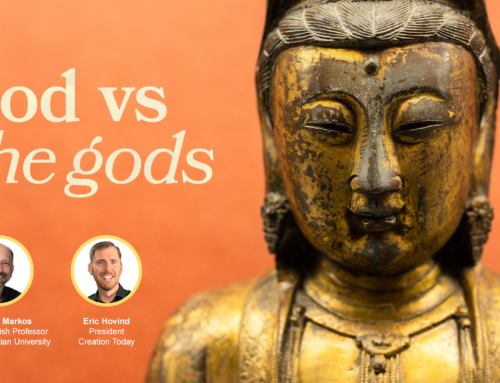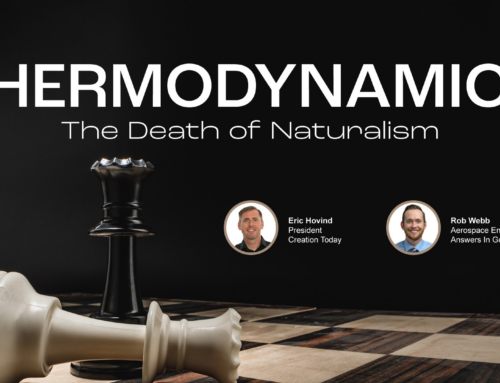Are there contradictions in the Resurrection Account? What about the bizarre claims made in Matthew about people rising from the grave after Jesus died? How should Christians respond to skeptics who challenge the veracity of miracles like this? This week’s LIVE discussion on Facebook answered these questions and more. Of course it’s always fun when our skeptic friends jump in and flavor the conversation with interesting assertions. Check out our latest video and tune in next Tuesday at 11:45 am (Central Time) for more!
Did the Dead Rise and Appear in Jerusalem?
by: Tim Chaffey
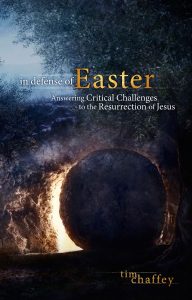
My book addresses skeptical attacks against Christ’s Resurrection. Available from my online store.
The four Gospels highlight dozens of miracles performed by Jesus. We read about Him curing the sick, healing the disabled, casting out demons, controlling nature, and raising the dead. Sometimes, Jesus healed a person by merely speaking, as He did when healing the centurion’s servant in Matthew 8:5–13. In other instances He touched the person to heal, like the time He healed two blind men near Jericho in Matthew 20:29–34. But sometimes the manner in which He healed a person seems rather bizarre, such as when He healed the deaf and mute man by putting His fingers in the man’s ears and then spitting and touching the man’s tongue (Mark 7:33).
As weird as that healing seems, there is one miracle recorded in the Gospels that appears even stranger. And it is this particular miracle that has received a growing amount of attention from skeptics in recent years. Sandwiched between Matthew’s account of Christ’s Crucifixion and Resurrection is the only record we know about of the following event. With the exception of the tearing of the temple veil, no other biblical writer, and no other historian mention these strange details:The four Gospels highlight dozens of miracles performed by Jesus. We read about Him curing the sick, healing the disabled, casting out demons, controlling nature, and raising the dead. Sometimes, Jesus healed a person by merely speaking, as He did when healing the centurion’s servant in Matthew 8:5–13. In other instances He touched the person to heal, like the time He healed two blind men near Jericho in Matthew 20:29–34. But sometimes the manner in which He healed a person seems rather bizarre, such as when He healed the deaf and mute man by putting His fingers in the man’s ears and then spitting and touching the man’s tongue (Mark 7:33).
Then, behold, the veil of the temple was torn in two from top to bottom; and the earth quaked, and the rocks were split, and the graves were opened; and many bodies of the saints who had fallen asleep were raised; and coming out of the graves after His resurrection, they went into the holy city and appeared to many. (Matthew 27:51–53)
In the past few years, I have had numerous skeptics challenge my belief in Christ’s Resurrection on the basis that Matthew is the only person who recorded this event. After all, they argue, such a monumental miracle—“many” people being raised and appearing to people in Jerusalem—surely would have made the news of the day. In other words, there is no way that other ancient writers would have neglected to write about such an amazing event, so Matthew must have simply made it up.
How should we respond to such a claim? Should Christians be concerned that Matthew is the only biblical writer to mention this exceptional miracle? What impact might this argument have on belief in the physical Resurrection of Jesus Christ?
Why Only Matthew?
Without an explanation from the biblical writers, I cannot say with certainty why they chose to write what they did. Of course, my theological explanation is that the Holy Spirit did not choose to have the other biblical writers to mention it. Why might that be the case? I have an explanation that I think makes very good sense.
Before getting to that explanation, let’s quickly consider the position of the skeptic. If three or four of the Gospel writers had mentioned that many saints appeared to people in Jerusalem around the time of Christ’s Resurrection, would the skeptics accept it as historical? I think the answer is obvious: they would not. How do I know? Well, all four Gospels affirm that Jesus rose from the dead, but they do not believe it. So in a sense, this objection does not seem to be all that genuine for most of the people who raise it.
Now why is Matthew the only one to talk about this event? Matthew clearly wrote his Gospel to Jewish readers. He repeatedly emphasized the fulfillment of Old Testament passages. In just the first two chapters of his book, he explains four events occurred “to fulfill what was spoken by the prophet(s)” (Matthew 1:22–23; 2:15, 17, 23). He knew his readers were very familiar with the Old Testament.
In the passage in question, Matthew explains an event that took place in Jerusalem. Some of his readers may have even been familiar with it, either through firsthand knowledge or by hearing it from others. But I believe the reason that Matthew mentions it is that the Jews, with the exception of the Sadducees, believed that people would physically rise from the dead. They looked forward to a future resurrection, based on passages like Daniel 12:2, which states, “And many of those who sleep in the dust of the earth shall awake, some to everlasting life, some to shame and everlasting contempt.” When Jesus spoke to Martha before raising her brother Lazarus, He said, “Your brother will rise again” (John 11:23). Consistent with normative Jewish belief of the day, she replied, “I know that he will rise again in the resurrection at the last day” (John 11:24). Of course, Jesus had other plans and raised Lazarus moments later.
Clearly, first century Jews believed in bodily resurrection—they just thought it would happen at the end of time. For Matthew to describe an event where multiple people were raised in conjunction with Christ’s death, burial, and Resurrection would not be a distraction to his readers. They might be surprised by the timing of such an event, but they would not be appalled by the idea of people rising from the dead. They might view the event as a foretaste of what is to come and confirmation that Jesus was indeed who He claimed to be. Perhaps this is why so many priests eventually came to believe in Him (Acts 6:7).
If this is accurate, then why did the other Gospel writers fail to mention the event? I think the reason is that they were writing to audiences consisting largely of Gentiles in a Hellenized world. For the most part, the Greeks abhorred the idea of a bodily resurrection. So while these writers needed to stress Christ’s Resurrection, bringing up this event would be an unnecessary distraction for their readers.
An example of the typical Greek reaction to bodily resurrection can be seen in Acts 17. When Paul preached to the Athenians, they called him a babbler and a proclaimer of foreign gods “because he preached to them Jesus and the resurrection” (Acts 17:18). Then he was invited to speak in the Areopagus, and as soon as he mentioned Jesus rising from the dead, many in the Greek audience ridiculed him (Acts 17:31–32).
When the apostles went around the Roman Empire proclaiming the gospel, the goal was to persuade people to believe in the death, burial, and Resurrection of Christ. They would not need to talk about a related event that is not essential to the main message and might simply introduce confusion. This might explain why Paul did not mention the event in 1 Corinthians 15, a book written to a church consisting largely of Gentiles. In that chapter he wrote 58 verses to defend Christ’s physical Resurrection and explain that bodily resurrection is in store for believers as well.
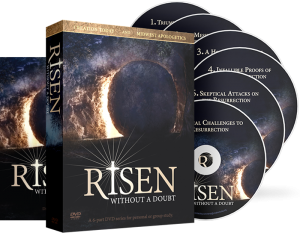
Learn how to defend the historical basis of the gospel. Through twelve sessions on 6 DVDs, Eric Hovind and I provide key insights into the Crucifixion and Resurrection and address scores of skeptical objections raised against the most important events in history. Available from my online store.
Why Mention the Other Resurrections?
One objection to this proposal is that Mark, Luke, and John all describe Jesus raising at least one person from the dead. Mark 5 and Luke 8 describe the raising of Jairus’ daughter and Luke 7 mentions the raising of the widow’s son. John 11 dramatically describes the raising of Lazarus. If the resurrection of the dead was so offensive to the Greek mindset, why would Mark, Luke, and John include these accounts?
This is a fair question, but it does not discount my solution to Matthew being the only one to mention many saints being raised. The miraculous raising of the dead described in Mark, Luke, and John occurred well before Christ’s own Resurrection. One of the reasons Greek-minded readers may not object to these is that the resurrections performed by Jesus in the Gospels were qualitatively different than His own Resurrection. Jairus’ daughter, the widow’s son, and Lazarus were not raised in glorified bodies that would never die again. It may be better to call these resuscitations or “revivications.” Jesus was raised in a glorified body that can never die again, and that body will be part of Him for all eternity. This is why Paul can call Jesus the firstfruits of those who rise from the dead in 1 Corinthians 15:23.
But what about the many saints who were raised around the time of Christ’s Crucifixion and Resurrection? Would they die again? Matthew does not specifically address this question, but given Paul’s identification of Jesus as the “firstfruits” of those who rise from the dead, it seems as if the many saints were probably not raised in glorified bodies and did die again. However, if Mark, Luke, or John would have described this event in such close proximity to the Lord’s Resurrection, it would likely have been a major distraction for Greek-minded readers. Why should they even bring it up when their goal is to help their readers understand that Jesus rose from the dead?
History, Myth, or Literary Device?
I believe the events happened just as they are described in Matthew 27:51–53. This is consistent with the majority of conservative Christian scholars. Since all of the details in the surrounding passages are written with the clear intent that they should be understood in a straightforward manner, it is natural to interpret these verses in the same way.
A few years ago, Mike Licona published an outstanding work on establishing the Resurrection of Jesus from a historian’s perspective (see my review of the book here). Near the end of the book, he raised a fair bit of controversy among Christians by proposing that maybe these verses should be understood as a literary device in which the author was using a popular convention of the day to show that an extremely important person had just died. A famous comet appeared just a few months after Julius Caesar’s assassination, and throughout Greek literature of that era, signs in the heavens are often associated with the demise of an important figure. After citing several of these examples, Licona postulated that Matthew may have simply been using a well-known literary device to stress the uniqueness of Jesus Christ. Several conservative scholars criticized Licona’s proposal, with some arguing that he sought to redefine the way in which we interpret the Gospels, a move which they believe would have devastating effects on the Christian faith if it became popular.
The concern for some Christians was that this passage has generally been held as historical so if one could reinterpret these words as just being some literary device, then what is to stop someone from taking that approach in other areas, particularly the Crucifixion narrative just before it and the Resurrection account that follow?
Overstating the Case
If what is described in this passage did not really happen, would it follow that we should stop viewing the Crucifixion and Resurrection as historical too? That is perhaps the major concern for Christians and is at the heart of the challenge from skeptics. But let’s think about this for a moment. Although they could never do it, if the skeptic could somehow demonstrate that these saints never rose, how would it have any bearing on whether Jesus rose from the dead? At best (for the skeptic) or worst (for the Christian), all that would have been accomplished is that a unique passage about saints rising from the dead is erroneous. This might be a strike against biblical inerrancy, but it would not have any impact on whether Jesus rose from the dead.
The Resurrection is not contingent upon the veracity of Matthew 27:51–53, and the Christian faith does not depend on the truth of that passage. Christianity rests upon the historical reality that Jesus died for our sins and conquered death when He rose from the dead. So in a sense, all the skeptic has done is introduce a red herring, an argument that distracts one from the issue at hand.
Let me clarify this point so there is no misunderstanding. I am not denying inerrancy (I strongly affirm it). But if this passage were untrue, a Christian could still argue for inerrancy by claiming that it was not originally part of Matthew’s Gospel but was added over the years. This has happened with some well-known verses (the woman caught in adultery in John 7:53–8:11 and the last twelve verses of Mark’s Gospel). Of course, this argument could not be presently supported since we know of no early manuscripts of Matthew 27 that lacks these verses, but the skeptic could never prove this claim wrong since the originals no longer exist. This is not my approach; I have merely raised this point to show how the skeptical charge misses the mark.
Conclusion
From a historical perspective, since we cannot interview Gospel writers and ask them why they did or did not include a certain passage, we cannot know with certainty why they may have avoided a given account. In the case of certain saints being raised and appearing to a bunch of people in Jerusalem, I have explained a very logical reason why only Matthew’s Gospel mentions this unique event. I cannot prove my view is correct, but this strange event recorded by Matthew cannot simply be dismissed because no one else wrote about it, and it definitely should not be used as an argument against the Lord’s Resurrection.
Christians can be confident that Jesus died on the Cross for the sins of the world and rose again on the third day, just as the Bible declares. No amount of critical or skeptical attacks will change the fact that the Lord defeated death by rising from the dead, giving believers the sure hope of eternal life with Him in immortal and incorruptible bodies (1 Corinthians 15:53).

